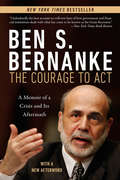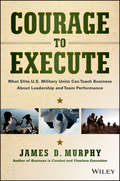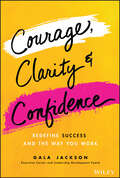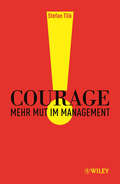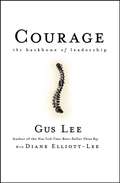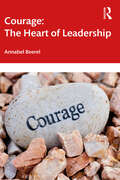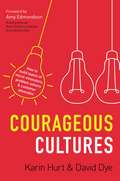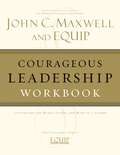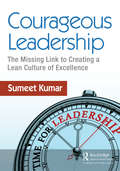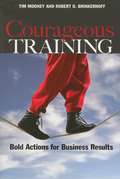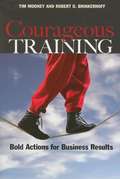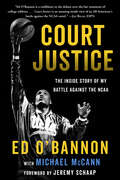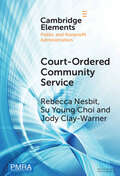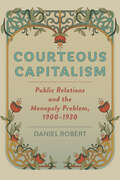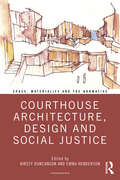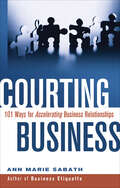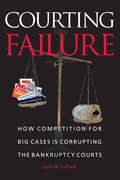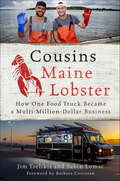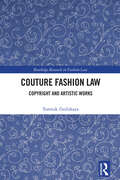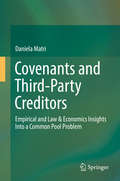- Table View
- List View
Courage to Act: A Memoir Of A Crisis And Its Aftermath
by Ben S. BernankeFrom the winner of the 2022 Nobel Prize in Economics A New York Times Bestseller “A fascinating account of the effort to save the world from another [Great Depression]. . . . Humanity should be grateful.”—Financial Times In 2006, Ben S. Bernanke was appointed chair of the Federal Reserve, the unexpected apex of a personal journey from small-town South Carolina to prestigious academic appointments and finally public service in Washington’s halls of power. There would be no time to celebrate. The bursting of a housing bubble in 2007 exposed the hidden vulnerabilities of the global financial system, bringing it to the brink of meltdown. From the implosion of the investment bank Bear Stearns to the unprecedented bailout of insurance giant AIG, efforts to arrest the financial contagion consumed Bernanke and his team at the Fed. Around the clock, they fought the crisis with every tool at their disposal to keep the United States and world economies afloat. Working with two U.S. presidents, and under fire from a fractious Congress and a public incensed by behavior on Wall Street, the Fed—alongside colleagues in the Treasury Department—successfully stabilized a teetering financial system. With creativity and decisiveness, they prevented an economic collapse of unimaginable scale and went on to craft the unorthodox programs that would help revive the U.S. economy and become the model for other countries. Rich with detail of the decision-making process in Washington and indelible portraits of the major players, The Courage to Act recounts and explains the worst financial crisis and economic slump in America since the Great Depression, providing an insider’s account of the policy response.
Courage to Execute
by James D. MurphyHow to build a culture of high performance within your organization The U.S. military in general, and its many elite organizations in particular, possesses a culture of high performance. Courage to Execute outlines the six basic principles that operate at the foundation of high performance, which include leadership, organization, communication, knowledge, experience, and discipline, known together as LOCKED. When all are practiced effectively, teamwork emerges. But the most elusive quality that exists at the heart of all elite military teams, the element that organizations and businesses deeply desire to perform more efficiently and effectively, is trust. Trust is easily spent, but hard won. Author James Murphy, an employer of approximately fifty senior military officers that have served in elite units such as the U.S. Navy Blue Angels, U.S. Navy SEALS, and U.S. Army Rangers, shares a multitude of personal leadership stories that illustrates the principles of LOCKED. Shares compelling anecdotes from leaders in elite units of the U.S. Military Written by James D. Murphy, founder and CEO of Afterburner, Inc., which has trained over 1.5 million executives, sales professionals, and business people from every industry in Afterburner's Flawless Execution Model, and its unique, high-energy programs Courage to Execute will help you develop effective leadership skills and build high-performance teams that out-compete your rivals every time.
Courage to Rise Above: Don't Be Afraid to Stand Out
by Jeffrey PfefferThis chapter offers some effective strategies for advancing your career and getting into a position of power.
Courage, Clarity, and Confidence: Redefine Success and the Way You Work
by Gala JacksonBuild a successful career with authenticity, confidence, and boldness The career roadmap every woman has been searching for is finally here! In Courage, Clarity, and Confidence: Redefine Success and the Way You Work, accomplished Executive Career and Leadership Development Coach Gala Jackson delivers a comprehensive playbook to help women reconnect with, or meet for the very first time, the strongest, boldest, and most courageous version of themselves. In her book, readers will explore their professional and personal journey; utilizing Gala’s ASCEND practice, readers will be able to define authentically aligned success and learn how to pursue it. The author shares her experiences and anecdotes from clients to demonstrate what is possible for women when they ditch the traditional patriarchal job search and career advancement methodologies that only benefit men. She also provides thought-provoking exercises throughout the book designed to equip you with how to build a future for yourself with courage, clarity, and confidence, even amid the challenging landscape of women and work. The book includes how to: Confidently embody the strongest, boldest, most courageous version of yourself to establish a career with flow and freedom Align your professional and personal identities for a new, empowering future without limitations Identify the power of your own voice and no longer minimize its value in or outside of the workplace Create and own your definition of success while leveraging your past and present professional experiences to achieve it Courage, Clarity, and Confidence is the professional guidebook for women searching for a tangible, practical, and action-oriented career roadmap that helps women cultivate their vision and voice and then guides them through how to harness their power to make it an everyday reality.
Courage: Mehr Mut im Management
by Stefan Tilk"Wir sind Weltmeister im Zögern und Zaudern." Passender als mit dieser Aussage von Jochen Kienbaum von Kienbaum Consulting kann die aktuelle Situation in Deutschland und das Verhalten seiner Manager nicht beschrieben werden. Die weltweite Finanzkrise, zahlreiche Unternehmensbankrotte, Banken vor dem Aus, Massenarbeitslosigkeit und Sozialsysteme gefährdet - es gibt genug Gründe, den Mut zu verlieren. Aber hilft uns das? Schluss mit Jammern und weichen Knien fordert Stefan Tilk. Gerade in den Unternehmen braucht es Manager, die sich trauen, Probleme anzupacken, die wissen, wie man das Ruder herumreißt und wieder auf Erfolgskurs kommt. Das einzig Richtige in Deutschland wäre, das wieder zu entdecken, was viele in den letzten Jahren mehr oder weniger verlernt haben: Mut im Management. Mut ist keine abstrakte Tugend, Mut ist eine konkrete Fähigkeit, die Managern täglich, und besonders auch in solchen Turnarounds, abverlangt wird. Stefan Tilk weiß, wovon er redet. Er hat schon mehrere Krisensituationen in Unternehmen erfolgreich gemeistert. In seinem Buch zeigt er, wie und womit Manager Turnarounds schaffen können. Betrachtet werden einerseits Manager, die in Augenblicken der Wahrheit aus Feigheit "gekniffen" haben und andererseits die wenigen Vorbilder, die Mut bewiesen und einen Wandel bewirken konnten.
Courage: The Backbone of Leadership
by Gus Lee Diane Elliott-LeeCourage: The Backbone of Leadership uses true stories from Whirlpool, Kaiser Permanente, IntegWare, and other actual organizations. This book has three parts. In Part One, we learn what happens when courage is not considered and what happens when it is. Part Two deals with "Courage in Action." Part Three, "Growing Your Courage," concludes with a set of take-away practices. The book makes us learn to use specific tools and measurements to apply the behaviors of courage in everyday situations.
Courage: The Heart of Leadership
by Annabel BeerelCourage lies at the heart of leadership. Leaders need courage to make wise decisions, not self-interested ones. They need to be able to set aside their egos, to feel vulnerable, to face challenges, yet remain principled and hold the course. This book presents many suggestions on how to make a real difference in organizations, and explains how one can develop the courage to be an effective leader, step by step.The book is designed to give leaders the self-awareness and the tools to overcome the obstacles that prevent us from leading effectively. Leadership requires working through the systemic barriers that serve as forcefields pulling and pushing us in various directions. Drawing on interviews with over 20 organizational leaders in a variety of industries, the book helps leaders to address key areas that are rarely discussed: the personal baggage attached to authority, self-esteem and self-differentiation, ego management, and the terror of the group. It highlights – with examples – how fear impairs our ability to make good decisions, and how our tendency to reactivity and the quick fix vitiates our attempts at being courageous. The hallmark of courage is the ability to have courageous conversations that invite transformation.The book is ideal reading for organizational leaders who are seeking ways to break through some of the personal and systemic barriers to leading with purpose in a way that makes a real difference.
Courageous Cultures: How to Build Teams of Micro-Innovators, Problem Solvers, and Customer Advocates
by Karin Hurt David DyeFrom executives complaining that their teams don&’t contribute ideas to employees throwing up their hands because their input isn&’t sought--company culture is the culprit. Courageous Cultures provides a road map to build a high-performance, high-engagement culture around sharing ideas, solving problems, and rewarding contributions from all levels.Many leaders are convinced they have an open environment that encourages employees to speak up and are shocked when they learn that employees are holding back. Employees have ideas and want to be heard. Leadership wants to hear them. Too often, however, employees and leaders both feel that no one cares about making things better. The disconnect typically only widens over time, with both sides becoming more firmly entrenched in their viewpoints.Becoming a courageous culture means building teams of microinnovators, problem solvers, and customer advocates working together. A microinnovator is the employee who consistently seeks out small, but powerful, ways to improve the business. A problem solver is the employee who cares about what&’s not working and wants to make it better. They uncover and speak openly about what&’s not working and think critically about how to fix it. A customer advocate is the employee who sees through your customers&’ eyes and speaks up on their behalf. They actively look for ways to improve customers&’ experience and minimize customer frustrations.In our world of rapid change, a courageous culture is your competitive advantage. It ensures that your company is &“sticky&” for both customers and employees. In this book you&’ll learn practical tools to uncover, leverage, and scale the best ideas from every level of your organization.See how the latest research conducted by the authors confirms why organizations struggle when it comes to creating strong cultures where employees are encouraged to contribute their best thinking.Learn proven models and tools that leaders can apply throughout all levels of the organization, to reengage and motivate employees.Understand best practices from companies around the world and learn how to apply these strategies and techniques in your own organization.
Courageous Leadership Workbook: The EQUIP Leadership Series
by John C. MaxwellCourageous Leadership Workbook will help both you and your leadership team become the exceptional leaders that God has called you to be. Now more than ever, the world is looking for great leaders. Biblical leadership goes beyond mere ability and personality. Consider your church staff, small group members, or colleagues: Are they leading as effectively as they could? Are they maximizing their own potential? Are they effectively cultivating the talents and gifts within those they influence? The Courageous Leadership Workbook serves as a "how to" guide for every leader.
Courageous Leadership: The Missing Link to Creating a Lean Culture of Excellence
by Sumeet KumarCourageous Leadership: The Missing Link to Creating a Lean Culture of Excellence is one of the firsts of its kind to wade through the confusion among leaders on selecting the type of change approach that will get the best results in their organization. It educates the senior executive leaders and organizational excellence practitioners on the different characteristics of change and answers why the approach to incremental and transitional change cannot deliver the results expected from a transformational change. The author shares his experiences from leading several small and large scale organization transformations in multiple industries across different countries on how to establish a robust foundation for an excellence journey and integrate strategy into daily operations. This book elaborates on the types of courage and what it means to be a courageous leader while leading change in difficult situations, and what leaders do differently for putting the organization on a path to excellence and culture transformation. This book shares an innovative design, a methodology and an approach that combines best practices and principles from Malcolm Baldrige, Shingo, Lean, Six Sigma, Balanced Scorecard, accreditation, change management, patient and family-centered care, the Competing Values Framework, the LEADS framework, and the project management body of knowledge. The implementation of this model at a hospital in Canada propelled the organization further ahead on their transformational journey compared to other organizations that started much earlier. Sensei in Japanese means Teacher and Gyaan in Sanskrit means Knowledge. Brief sections on ‘Sensei Gyaan’ have been interspersed throughout the book to provide valuable tips to the readers based on author’s experiential learnings over the past two decades. This book serves as a practical guide for senior executive leaders and organizational excellence practitioners, who wish to embark or are in various stages of their organizational excellence and culture transformation journey. Readers will be guided through 26 elements necessary for establishing a robust foundation and an additional set of 22 Management System elements required to create and sustain a culture of quality across the organization. For leaders in healthcare, the book provides a framework, guiding principles, and associated practices that support the implementation of the 4 core concepts of patient and family centered care namely, dignity and respect, information sharing, participation and collaboration. Included in the book are several examples with creative visuals, ready-to-use templates and standard works, models, guiding principles, and strategies based on best practices to assist leaders in their organization excellence journey.
Courageous Training
by Tim Mooney Robert O. BrinkerhoffDozens of books have been written about how to do training more effectively, with more impact, and so on. Yet despite all that well-meaning advice, of the $70 billion spent on training in the U. S., only 12-15 percent actually gets applied in ways that contribute tangible value to organizations. But Tim Mooney and Robert Brinkerhoff have discovered that some iconoclastic trainers achieve breakthrough results by having the courage to break away from the usual approaches and identify what is really needed and what really works. Studying why these bold training leaders were so successful implementing Brinkerhoff and Mooney's High Impact Learning tools and methods led them to distill the principles and practices outlined in Courageous Training. Mooney and Brinkerhoff lay out the Four Pillars of Courageous Training, illustrating each with real-life examples that highlight specific concepts, methods, and tools. Going deeper, they delve into the mindset needed to truly transform training, which they summarize in the Courageous Training Code. And they present four in-depth case studies, written by training leaders in major organizations, showing the audacious actions these leaders took to produce dramatic--and measurable--business results.
Courageous Training: Bold Actions for Business Results
by Tim Mooney Robert O. BrinkerhoffFor years there have been dozens of books about training and how to do it more effectively, with more impact, with greater focus on performance, and so on, and on. Yet despite the surge of books and advice over the past decade, training departments continue to struggle to produce concrete results, and the value of training is constantly questioned. But some "upstarts" are achieving results in a radical, non-traditional way in small pockets around the world. Based on four years of Advantage Performance Group's groundbreaking work, and featuring numerous real-life stories and several illuminating case studies, this book shares the process, the journey, and the professional courage these professionals took to ensure that they were helping their organizations achieve important business results.
Courageous Visions: How to Unleash Passionate Energy in Your Life and Your Organization
by Martha LasleyWe've been conditioned to think that the CEO is the visionary who provides clear direction, but hero-leaders who make the headlines and become celebrities don't always have the skills to awaken the passion of those they lead. Attacking the myth that visions should come from the lone leader, Courageous Visions provides tools and resources that inspire employees at all levels to contribute and expand on the vision. The author, Martha Lasley, bases her book on the premise that personal visions are the spark for larger organizational visions.
Coursera
by Ramon Casadesus-Masanell Hyunjin KimBy providing free and open-access online courses at a large scale, Massive Open Online Course (MOOC) platforms seek to innovate the business models of the traditional higher education industry. In a little over a year, Coursera had grown at a rapid rate to emerge as a leader of the MOOCs in terms of the number of student enrollments, courses, and partners. The case examines two aspects of these developments in the industry: (1) What choices did Coursera make that enabled it to grow so quickly? (2) In what ways did Coursera's success impact the success of its competitors, Udacity and edX? Would one player naturally come to dominate the industry, and if so, what choices should Coursera make to retain its market positioning?
Court Justice: The Inside Story of My Battle Against the NCAA
by Michael McCann Ed O'Bannon“Like Curt Flood and Oscar Robertson, who paved the way for free agency in sports, Ed O’Bannon decided there was a principle at stake… O’Bannon gave the movement to reform college sports…passion and purpose, animated by righteous indignation.” —Jeremy Schaap, ESPN journalist and New York Times bestselling author In 2009, Ed O’Bannon, once a star for the 1995 NCAA Champion UCLA Bruins and a first-round NBA draft pick, thought he’d made peace with the NCAA’s exploitive system of “amateurism.” College athletes generated huge profits, yet—training nearly full-time, forced to tailor coursework around sports, often pawns in corrupt investigations—they saw little from those riches other than revocable scholarships and miniscule chances of going pro. Still, that was all in O’Bannon’s past…until he saw the video game NCAA Basketball 09. As avatars of their college selves—their likenesses, achievements, and playing styles—O’Bannon and his teammates were still making money for the NCAA. So, when asked to fight the system for players past, present, and future—and seeking no personal financial reward, but rather the chance to make college sports more fair—he agreed to be the face of what became a landmark class-action lawsuit.Court Justice brings readers to the front lines of a critical battle in the long fight for players’ rights while also offering O’Bannon’s unique perspective on today’s NCAA recruiting scandals. From the basketball court to the court of law facing NCAA executives, athletic directors, and “expert” witnesses; and finally to his innovative ideas for reform, O’Bannon breaks down history’s most important victory yet against the inequitable model of multi-billion-dollar “amateur” sports.
Court-Ordered Community Service: The Experiences of Community Organizations and Community Service Workers (Elements in Public and Nonprofit Administration)
by Jody Clay-Warner Rebecca Nesbit Su Young ChoiCommunity service is a common court-ordered sanction in many countries. Individuals sentenced to community service must work a specified number of uncompensated hours at an approved community agency, typically as a condition of probation. A core expectation of court-ordered community service is that the community agencies benefit from this labor. However, very little research examines the organizational and interpersonal dynamics involved when community organizations work with court-ordered community service workers. What are local public and nonprofit organizations' experiences with court-ordered community service workers? How do the workers, themselves, experience court-ordered community service within community agencies? We address these questions through interviews with 31 volunteer managers and 34 court-ordered community service workers in two court jurisdictions in Northeast Georgia. We frame our findings within the volunteer management literature and suggest practices that could improve experiences for both the court-ordered community service worker and the community organization.
Courteous Capitalism: Public Relations And The Monopoly Problem, 1900-1930 (Hagley Library Studies In Business, Technology, And Politics Ser.)
by Daniel RobertCourthouse Architecture, Design and Social Justice
by Emma Henderson Kirsty DuncansonThis collection interrogates relationships between court architecture and social justice, from consultation and design to the impact of material (and immaterial) forms on court users, through the lenses of architecture, law, socio-legal studies, criminology, anthropology, and a former high court judge. International multidisciplinary collaborations and single-author contributions traverse a range of methodological approaches to present new insights into the relationship between architecture, design, and justice. These include praxis, photography, reflections on process and decolonising practice, postcolonial, feminist, and poststructural analysis, and theory from critical legal scholarship, political science, criminology, literature, sociology, and architecture. While the opening contributions reflect on establishing design principles and architectural methodologies for ethical consultation and collaboration with communities historically marginalised and exploited by law, the central chapters explore the textures and affects of built forms and the spaces between; examining the disjuncture between design intention and use; and investigating the impact of architecture and the design of space. The collection finishes with contemplations of the very real significance of material presence or absence in courtroom spaces and what this might mean for justice. Courthouse Architecture, Design and Social Justice provides tools for those engaged in creating, and reflecting on, ethical design and building use, and deepens the dialogue across disciplinary boundaries towards further collaborative work in the field. It also exists as a new resource for research and teaching, facilitating undergraduate critical thought about the ways in which design enhances and restricts access to justice.
Courting Business: 101 Ways for Accelerating Business Relationships
by Ann Marie SabathWhy waste your time chasing after prospects when you can get them to come to you?Most self-proclaimed rainmakers let business drizzle in rather than positioning themselves to experience a downpour. Courting Business gives you the strategies for getting prospects to contact you. Ann Marie Sabath's proven three-step strategy will inspire you to be creative, consistent, and politely relentless in a way that will please even the toughest prospects. This hands-on guide offers tips and techniques for successfully attracting and closing business.With Courting Business, you'll: •Discover the three most important qualities for success.•See why if you're on time, you're late!•Realize how instilling the sense of urgency in your professional style will differentiate you from your competition.•Learn why doing more for fewer people will assist you in developing stronger relationships.•Establish instant rapport with prospects and clients through the use of connectors.•Learn how to overcome the fear of rejection.•Figure out how to turn a "no" today into a "yes" tomorrow.•And much more!
Courting Failure
by Lynn M. LopuckiLoPucki's provocative critique of Chapter 11 is required reading for everyone who cares about bankruptcy reform. This empirical account of large Chapter 11 cases will trigger intense debate both inside the academy and on the floor of Congress. Confronting LoPucki's controversial thesis-that competition between bankruptcy judges is corrupting them-is the most pressing challenge now facing any defender of the status quo. " -Douglas Baird, University of Chicago Law School "This book is smart, shocking and funny. This story has everything-professional greed, wrecked companies, and embarrassed judges. Insiders are already buzzing. " -Elizabeth Warren, Leo Gottlieb Professor of Law, Harvard Law School "LoPucki provides a scathing attack on reorganization practice. Courting Failurerecounts how lawyers, managers and judges have transformed Chapter 11. It uses empirical data to explore how the interests of the various participants have combined to create a system markedly different from the one envisioned by Congress. LoPucki not only questions the wisdom of these changes but also the free market ideology that supports much of the general regulation of the corporate sector. " -Robert Rasmussen, University of Chicago Law School A sobering chronicle of our broken bankruptcy-court system,Courting Failureexposes yet another American institution corrupted by greed, avarice, and the thirst for power. Lynn LoPucki's eye-opening account of the widespread and systematic decay of America's bankruptcy courts is a blockbuster story that has yet to be reported in the media. LoPucki reveals the profound corruption in the U. S. bankruptcy system and how this breakdown has directly led to the major corporate failures of the last decade, including Enron, MCI, WorldCom, and Global Crossing. LoPucki, one of the nation's leading experts on bankruptcy law, offers a clear and compelling picture of the destructive power of "forum shopping," in which corporations choose courts that offer the most favorable outcome for bankruptcy litigation. The courts, lured by big money and prestige, streamline their requirements and lower their standards to compete for these lucrative cases. The result has been a series of increasingly shoddy reorganizations of major American corporations, proposed by greedy corporate executives and authorized by case-hungry judges.
Courtroom Testimony for Fingerprint Examiners
by Hillary Moses DaluzFingerprint examiners today are expected to develop, research and defend the scientific basis of their conclusions. Recent emphasis placed on scientific rigor and transparency through documentation has created a culture shift in the field. Many examiners are baffled by the resulting cultural, procedural and scientific distinctions, often becoming overwhelmed when required to testify as an expert witness to explain such concepts in the courtroom. Courtroom Testimony for Fingerprint Examiners addresses all aspects of courtroom testimony as the first book to focus solely on testifying on fingerprint evidence as a comparative science. The book is presented in two parts. Section I addresses general expert witnessing for forensic scientists. This serves as a primer for the novice or a review for experienced witnesses covering such topics as the structure of the criminal justice system and federal rules of evidence, the role of the expert witness, testimony as teaching, presenting challenging scientific concepts to the layperson, court preparation, the three phases of expert witness testimony and landmark court decisions that have shaped the modern landscape of forensic testimony. Section II focuses on specific issues affecting fingerprint examiners and how to field questions during both direct and cross-examination. While such "hot button" topics are absent from currently available texts, this section pays particular attention to these salient, emerging topics. This includes evidentiary challenges to fingerprint evidence, relevant publications such as the PCAST report, nomenclature and standards development, issues surrounding cognitive bias and subjectivity, probability models, error rates and cases of error and how to address issues of minimum point standards in both the empirical and holistic traditions. Both Section I and Section II provide examples and present innovations applicable to latent and tenprint examiners. Features include: Presents a history of fingerprint evidence and current best practices and limits on characterizing fingerprint evidence in court, including appropriate nomenclature Provides current guidelines and recommendations for standards and the courtroom Illustrates how experts can work with attorneys so that the testimony process educates and informs jurors and judges rather than perpetuating an adversarial dynamic Addresses important issues such as cognitive bias, subjectivity, error rates, probability models and ethics As a forensic training instructor for professionals – and previously as a college professor – author Hillary Moses Daluz has spent the past ten years teaching courtroom testimony courses to forensic scientists. Courtroom Testimony for Fingerprint Examiners offers an invaluable resource to forensic scientists, latent print examiners, tenprint examiners, lab personnel in related comparative fields, attorneys, investigative professionals and students enrolled in forensic science university programs.
Cousins Maine Lobster: How One Food Truck Became a Multi-Million-Dollar Business
by Jim Tselikis Sabin Lomac"Required Reading,"The New York PostFrom the co-founders of the smash hit Cousins Maine Lobster food trucks comes a business book revealing to new entrepreneurs how the authors built their brand through integrity and authenticity.In early 2012, Jim Tselikis visited L.A. and met up with his cousin Sabin Lomac. Over a few drinks they waxed nostalgic about their childhood in Maine, surrounded by family, often elbow deep in delicious lobster while gathered around the picnic table. From this strong memory was born the very first Cousins Maine Lobster food truck. Smart, authentic marketing, and sustainable, delicious ingredients helped turn that one food truck into an overnight sensation. Then, in just three years, they went from a single food truck to a nationally-franchised legion of trucks, an online delivery service, and a brick-and-mortar restaurant, grossing over $15 million dollars in sales a year. Start-up fever has taken hold of America, and there are hundreds of books to teach readers how to become an entrepreneur; this is the first book to answer the question: What’s next? At each step, Jim and Sabin were faced with hard decisions—opening each new food truck carefully instead of rushing to meet the demand; turning down a six-figure franchise offer because it came from someone who didn’t support their vision; turning down Shark Tank (twice) until they could insist on participating only if Barbara Corcoran was one of the Sharks. Now Jim and Sabin teach readers how they, too, can reach the next level of success in their own businesses, without having to compromise themselves.
Couture Fashion Law: Copyright and Artistic Works (Routledge Research in Fashion Law)
by Tomruk ŰstűnkayaThis book provides an insight into the legal workings of the most ostentatious fashion sector, Couture, whilst simultaneously advocating for stronger legal protection in this industry.Offering an interdisciplinary approach, including art theory from Tolstoy and Rand amongst others, the book examines where Couture fashion sits within the law. Most significantly the book considers the couturier as an ‘artist’ and Couture as ‘art’ in relation to how this art form may be protected legally by copyright. Reflecting on contemporary issues, it analyses recent legal cases together with legislation, to provide awareness on the current position, and considers implications for the future by suggesting legal frameworks in pursuit of improvements. Using U.K. law as a case study, the book also comparatively assesses global fashion law, analysing the legal workings in the E.U. and the U.S.The book will be of interest to researchers in the field of fashion law, copyright law, art, and intellectual property.
Covenants and Third-Party Creditors: Empirical and Law & Economics Insights Into a Common Pool Problem
by Daniela MatriThis book adds to the debate on the effects of covenants on third-party creditors (externalities), which have recently become a focus of discussion in the contexts of bankruptcy law, corporate law and corporate governance. The general thrust of the debate is that negative effects on third-party creditors predominate because banks act in their own self-interest. After systematising the debated potential positive and negative externalities of covenants, the book empirically examines these externalities: It investigates the banks' factual conduct and its effects on third-party creditors in Germany and the US. The study's most significant outcome is that it disproves the assumption that banks disregard third-party creditors' interests. These findings are then interpreted with the tools of economic analysis; particularly, with the concept of common pool resources (CPRs). Around the aggregated value of the debtor company's asset pool (as CPR) exists an n-person prisoner's dilemma between banks and third-party creditors: No creditor knows when and under what conditions the other creditor will appropriate funds from the debtor company's asset pool. This coordination problem is traditionally addressed by means of bankruptcy law and collaterals. However, the incentive structure that surrounds the bilateral private governance system created by covenants and an event of default clause (a CPR private governance system) is found to also be capable of tackling this problem. Moreover, the interaction between the different regulation spheres - bankruptcy law, collateral and the CPR private governance system − has important implications for both the aforementioned discussions as well as the legal treatment of covenants and event of default clauses. Covenants alone cannot be seen as an alternative to institutional regulation; the complete CPR private governance system and its interaction with institutional regulation must also be taken into consideration. In addition, their function must first find more acceptance and respect in the legal treatment of covenants and event of default clauses: The CPR private governance system fills a gap in the regulation of the tragedy of the commons by bankruptcy law and collateral. This has particularly important implications for the German #65533; 138 BGB, #65533; 826 BGB and ad hoc duties to disclose insider information.
Coventry's Motorcar Heritage
by Damien KimberleyCoventry, home of the cycle industry, was also to become the birthplace of the motor industry when the Daimler Company became the first in Britain to mass produce cars in the late 1890s. Spearheaded by H.J. Lawson, Coventry soon became a hub of motoring activity, and by the early 1900s was teaming with small and large companies, testing cars, motor-bicycles and tricycles around the local streets and surrounding country lanes. Many of these companies had previously been established as cycle manufacturers, yet introduced engines to their cycle frames in various forms, as well as producing safer three- and four-wheeled experimental machines. Other companies were established solely as motor manufacturers, many were short-lived, but others would survive and prosper. This new-found industry soon attracted a new type of worker to Coventry, specialised in mechanical engineering. These men and their families came from all parts of the UK and beyond, and made new lives for themselves in the city. Coventry has been home to well in excess of 100 independent motor manufacturers, but in recent years the city has suffered greatly with the loss of huge companied like Jaguar and Peugeot. The legacy of many of these historic cars can, however, still be enjoyed through museums and private collections. This outstanding volume is illustrated with 200 archive photographs and ephemera from the collection held at Coventry Transport Museum, and is a valuable record of the motor companies and their machines, as well as the individuals who both founded and worked for these manufacturers.
